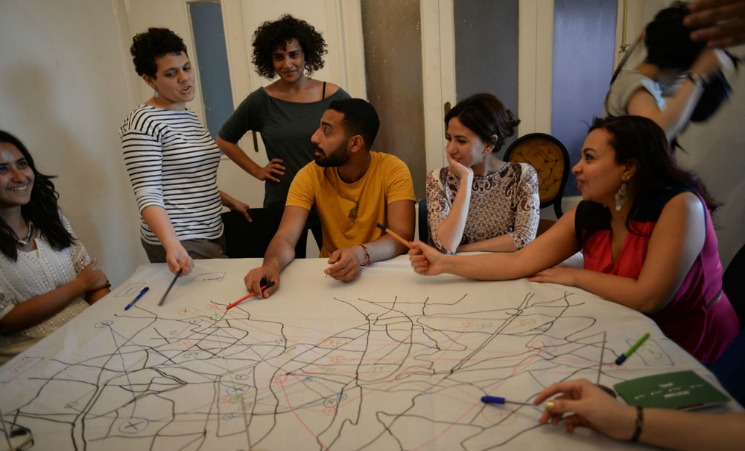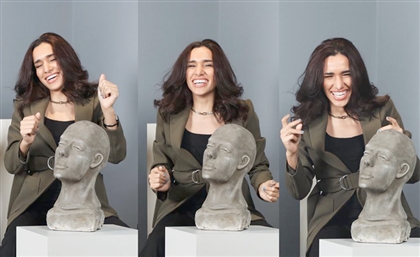Home Visit Cairo: A Game That Gathers Strangers Around The Same Dining Table
Sanabel al-Najjar pops over for one of D-CAF’s Home Visit Cairo performances, where strangers are gathered around a table and, with the help of a robot, participate in a game that makes it seem like they've known each other for ages.

It's funny how we seem to grow up and grow old without ever forgetting the warmth of our homes – the touch of the protruding floral imprints on the living room couch, the neglected blue and golden vase over the kitchen cupboard, and the way morning light used to find its way among the bushy green trees and onto your face in your beloved little room with all the posters and the books piled on the floor, feeding the love for a life that never seemed to deeply cut, no matter the brutality of the fight.
We move in and out of homes and we cling on to places and form a humane bond with concrete buildings as those were the places that held us at different phases of our journeys. Your first dorm room when you were set to start life on your own for the very first time; the little wall you used to lean by on campus, which was the same spot you met the most beautiful person in your life; the office where you had your first (fruitful) interview; the café where your heart truly broke for the first time; the hospital where you visited a loved one before they passed away; and the first home you got with your spouse.
It is for this reason that we sometimes (seemingly inexplicably) feel our soul heightened or hurt subconsciously because of the place where we happen to be. The little intricate details coming into play while we are present in one place or another truly affects the way we feel at the time. Maybe the neon light was too strong in the living room that time you visited your aunt in her small house; maybe the soppy fading beige couch in your friend’s room gave you a feeling of discomfort; or maybe the see-through office partitions are the real reason why you want to strangle your kind boss.
This fascinating subject has sparked the interest of many artists and scholars, naturally. Among them are artists Helgard Haug, Stefan Kaegi, and Daniel Wetzel, working under the name Rimini Protokoll, who have come up with the concept and the script behind Home Visit, and also took on its direction for D-CAF 2016. Born in Germany, Home Visit is a performance game, which, in coordination with several other European theatres and organisations, brings to light the concept of a “performance you can put in your hand luggage - big ideas are rarely presented so intimately. What is Europe, actually? Rimini Protokoll contrasts this abstract idea of Europe with the individuality of a private apartment. Fifteen people become part of a performance in a living room that interweaves personal stories and the political mechanisms of Europe,” according to their description on their website.
Usually, each performance (or game) is enacted (or played) at a stranger’s house, where a group of strangers gather at a table with a cloth on which the map of the city is outlined in preparation. Of course, reading this description, you are probably wondering why we don't have this here in Cairo; the answer to that is that, well, we actually do.
As part of the 5th D-CAF festival this year, Home Visits Cairo thrills us with the taste of a novel concept enacted in front of us. I had the wonderful opportunity to participate in one of those home visits. However, before venturing into this strange and interesting experience, I had to find out more. Talking to Germany’s Home Visits’ Master of Ceremony, Anton Rose, I was able to find out more about the idea behind this new concept and its experience. After all, I had to have some background of this game before I venture into playing it!
I noted to Rose that the idea of Home Visits is very layered and wondered whether he knows about the origin or inspiration of the idea. “I’m not really sure how the idea originated or came about. But I know that the idea would not have existed without the three guys from the Rimini Protokoll, they are the core of the Rimini Protokoll and usually come up with the ideas and start applying them,” he said.

However, Rose was able to give me a small peek into the minds of the three members and what they might have been thinking regarding Home Visit and its creation. “I think they had wanted to do something about the idea of Europe as they could see how conflicting it is to live in it. Because, on the one side, you live in a certain area, city, or country, but at the same time, you have this weird and abstract construction of nationality but also this continent of Europe. You see, the idea of European Union is very hard to grasp – this distance from your daily life. I mean, you live in the EU, which has a thousand good reasons for it to exist and ways in which it affects your daily life, but at the same time, it’s more abstract than nationality, even, or the region, or wherever you come from,” he explains.
Rose adds that “I think they were trying to find a way to show in what way your personal values are also reflected – or not – by this whole idea of Europe. This is because, given this whole concept of countries, we see that they are somehow visible but at the same time are very invisible. I mean, you are surrounded all day by concepts about how the country should be run in Egypt or how a city can be, but every day, through your movement in Cairo or Berlin, sometimes you feel [the visibility] and sometimes you don’t.”
It is this impression, Rose tells me, that he got when he first played Home Visit. “I feel like it’s a really nice way to get people to start thinking about themselves, their personal values, and their ideas about how life should be; how they or others should behave and what’s important in their lives," he says. "And then you will meet other people. And every time you meet other people, you will be confronted with different views in life. Maybe those ideas overlap to a great deal, but they will also be mutually exclusive at certain points.”
Rose drops some Aristotelian philosophy and goes on to say that “we are social beings. So, in social contact, you realise yourself and others, as well as other concepts of life; to have this connection made by making people meet each other in a certain way and also structuring that process so that they meet each other. Then, and this is what I find most interesting about Home Visit, is that it brings people together where they share their thoughts and some facts about their life. They get to know each other in a way, and then it gets connected to the concept of the country.”
I asked Rose whether he agrees with me that Home Visit is a reflection of that and, in fact, attempts to merge (or perhaps contrast) the public with the private sphere as it reflects something quite intimate in a public setting, and why he was interested in taking part in this. To that, he answers: “I thought it was a really interesting job, to do that. I really like to work with people and also like to moderate. This seemed to me like a position I would love to do and be good at. I really enjoyed taking part in the shows. From the very beginning, it was clear that they were doing the shows in very different places in Europe, which would be adapted to the culture and language of the place,” such as what happened in Cairo. Excited even more than before, I took a walk through Downtown Cairo's Champollion Street and took the vintage elevator up to the 8th floor, where the Home Visit apartment door was open to us strangers. After some introductions, we sat at the hostess’ table, with the map of Cairo outlined on a cloth. We all had markers that we used to draw points on the piece of cloth. The moderator set down a strange-looking machine with a roll of paper and flickering lights.
Excited even more than before, I took a walk through Downtown Cairo's Champollion Street and took the vintage elevator up to the 8th floor, where the Home Visit apartment door was open to us strangers. After some introductions, we sat at the hostess’ table, with the map of Cairo outlined on a cloth. We all had markers that we used to draw points on the piece of cloth. The moderator set down a strange-looking machine with a roll of paper and flickering lights.
He told us it’s called ‘the brain’, which – based on the information about us fed wirelessly into it, and of course with the help of MC Ahmed Achrafi – generates questions and demands us to respond in order to delve into how people usually process human and conceptual relationships. The little slips generated by 'the brain' included a lot of interesting historical information about the city, as well as political and social questions. At the end of the game, the cake was ready and the team with the most points got the biggest slice of it. But it was chocolate cake, so you can imagine that the division was not really as clear-cut. When I asked Achrafi, MC of the Cairo Home Visit, about what interested him the most, the young actor and theatre enthusiast told me, "It was that the people who were playing the game eventually get used to and comfortable with each other. They cooperate and conspire. I found it amazing that the strangers playing the game really seemed like they had been known each other for years!"
After I said goodbye to the now familiar ‘strangers’ with whom I laughed and chatted, and as I was on my way back down the vintage elevator, I was wondering how different that game would have been in Berlin, Moscow, Kabul, or Beirut. I realised, yet again, that it never ceases to fascinate me how simultaneously different and similar we are to each other. But a home usually emits the same kind of warmth to all those who were lucky enough to have one, and that it is truly funny how we seem to grow up and grow old without ever forgetting the warmth of our homes.
Good news! You can still participate in the Home Visit Cairo performances/plays as they are ongoing as part of D-CAF until the 14th of the month.
For more information, you can visit D-CAF’s website and Facebook.
Photo shoot by @MO4Ntetwork's #MO4Productions.
Photography by Ahmed Najeeb.
- Previous Article Hijabi Fashion and the “Enslavement of Women”
- Next Article 10 Strictly Egyptian Moustaches That Will Inspire You This Movember
Trending This Week
-
Mar 09, 2025























